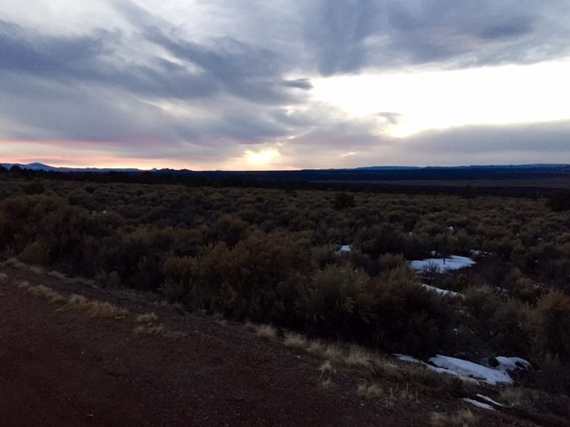photograph by the author
The biblical book of Numbers is a dazzling tapestry -- or perhaps more accurately a boggling patchwork quilt, with alternating segments of structuring orders and narrative set-pieces, patterns for marching and encamping and serving in the sanctuary juxtaposed with battles and dramatic episodes and tales of wonder.
Beyond the critical tendency to tear it all apart and discern piece from piece, the more exciting and inspiring project may be to puzzle over how it all fits together, and why. And still, for all that one may ponder, the kaleidoscopic sense of mystery tends mostly to increase.
This week in particular brings us an almost overwhelming potpourri of a reading -
A seven branched lampstand for the tabernacle,
and the setting apart of the Levites to serve;
and a delayed Passover rite for those impure at the time of the holiday;
and a pillar of fire and a pillar of smoke to go before the camp night and day;
and two silver trumpets for mustering the people;
and the order of the tribes' assembly;
and fire ravaging the outskirts of the contentious camp;
and manna in the morning dew, and hunger,
and a sudden slew of quail, and gluttony, and sickness;
and Moses saying to God, 'It is all too much, I cannot bear the people through all of this all by myself;'
and seventy elders; and Eldad and Medad "prophesying within the camp" -
whoever they were (beyond their being among the seventy)
and whatever it means that they prophesied;
and rebellious siblings; and leprosy, and healing;
"and after that the people set out from Hazeroth and encamped in the wilderness of Paran."
One may be forgiven, in the midst of such a miscellany, for feeling something like the prophet Zechariah, whose experience of prophecy - as narrated, for example, in the segment of his book paired with our Torah-portion this week - is frequently baffling, to himself.
Bouncing from vision to vision, perplexed again and again, Zechariah is given to see - four horns, and a measuring rod, and a heavenly tribunal, and a golden menorah flanked by olive trees, and a flying scroll, and on and on. And again and again, as the angel who guides him from sight to sight asks, "What do you see?" and Zechariah answers, and the angel responds, "Do you know what these are?" the prophet finds himself at a loss for sense.
"Do you not know what these things mean?" asked the angel who spoke within me, and I said, "No, my lord," and "What are these things, my lord?" (e.g. Zechariah 4:1-5)
One can be forgiven for feeling somewhat that way living in our times - perhaps in any times.
Bewildering presidential politics, and a Brexit vote; and marriage equality at long last, and Orlando; and United States v. Texas, and Fisher v. University of Texas at Austin; and, in our own Harvard Jewish community, the funeral of one recent undergraduate leader in the past week, and the wedding of another in the week to come.
Kadur banot - a play-toy, literally a "girls' ball" -
That is the pun, or play on words, that ancient rabbinic commentary comes up with at the readings of this week, borrowing a resoundingly recondite verse from toward the end of Ecclesiastes, which seems to bespeak the variety and authority of scripture all at once - "The words of the wise are like goads, and like nails firmly fixed, the masters of assemblies, all given from one shepherd" (Ecclesiastes 12:11) - and turning the consonants of its Hebrew word for "like goads" - kedorbanot - into that bouncing girls' ball, by way of different vowels - kadur banot.
And so we bounce - and have been thrown, this way and that, so indicates the commentary, since Sinai.
Divine words resonating from one age to the next, reflecting from event after event, and echoing from interpretation to interpretation, tossed back and forth from sage to sage - and what, in the end, do we learn?
Perhaps most of all to keep asking, resolutely, like Zechariah, again and again, "What are these things, my Lord?"
And we learn to keep our ears and hearts attuned for the answers that echo from inside ourselves - even as we learn, again and again, that such answers as we can discern goad most of all toward asking the same question yet again.

